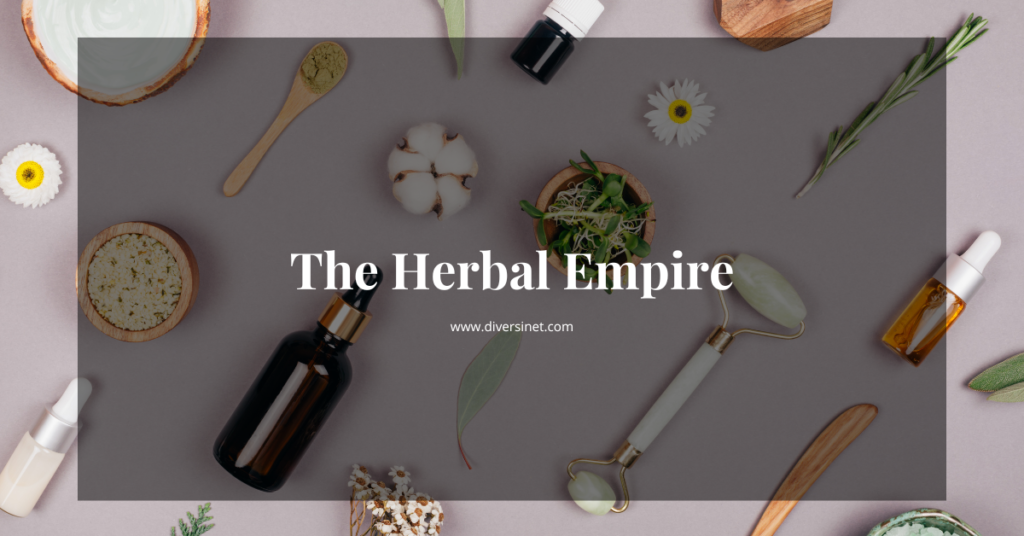Herbal medicine, one of the oldest forms of healing in human history, continues to thrive in modern times. As the global interest in natural health remedies grows, more people are seeking out herbal alternatives to pharmaceutical drugs, embracing the wellness and therapeutic benefits of plants. This “Herbal Empire,” a term that evokes the widespread influence of herbs across cultures and civilizations, has witnessed a resurgence in recent decades. It spans a vast realm, from traditional healing systems in Asia to cutting-edge scientific studies on herbal compounds.
In this article, we will explore the rich history, practices, and modern relevance of herbal medicine, uncovering its origins, benefits, challenges, and the future of herbal remedies in a world increasingly focused on holistic health and sustainability.
1. The Origins of Herbal Medicine
Herbal medicine is as old as human civilization itself. Early humans learned from their environment, observing how plants were used by animals and indigenous peoples for food, shelter, and healing. The healing power of plants has been recognized for thousands of years, with some of the first records dating back to ancient civilizations such as Mesopotamia, Egypt, China, and India.
1.1 Ancient Egypt
The ancient Egyptians were pioneers in the development of herbal medicine. Texts like the Ebers Papyrus, written around 1550 BCE, contain over 700 medicinal formulas, many of which are still in use today. The Egyptians utilized plants such as garlic, coriander, and juniper to treat a variety of ailments. Their extensive knowledge was passed down through generations, influencing both Greek and Roman medical traditions.
1.2 Ancient China and Ayurveda
In China, herbal medicine has been integral to traditional Chinese medicine (TCM) for over 3,000 years. The Shennong Ben Cao Jing, one of the earliest pharmacological texts, classifies over 360 plants based on their medicinal properties. Plants such as ginseng, ginger, and licorice were revered for their healing powers and are still commonly used in TCM today.
Similarly, the Ayurvedic tradition of India, which has been practiced for over 5,000 years, is based on balancing the body’s energies through diet, lifestyle, and herbal medicine. Ayurvedic texts like the Charaka Samhita contain detailed information about over 200 herbs, many of which have been corroborated by modern science for their therapeutic benefits. Herbs like turmeric, ashwagandha, and neem have been used for everything from enhancing digestion to treating skin conditions.
1.3 The Role of Ancient Greece and Rome
Ancient Greek and Roman civilizations also contributed significantly to the development of herbal medicine. Figures such as Hippocrates, the “Father of Medicine,” recommended herbs like sage and mint for various health conditions. The Roman physician Dioscorides, author of the influential herbal guide De Materia Medica, cataloged hundreds of medicinal plants, many of which are still in use today.
1.4 Herbal Medicine in the Medieval and Renaissance Periods
In the Middle Ages, herbal medicine was largely preserved by monastic communities, who cultivated and studied medicinal plants in their gardens. The Physica by Hildegard of Bingen and the Herbals of Renaissance scholars further contributed to the knowledge of plants and their uses in healing.
2. Herbal Empire in the Modern Era
As Western medicine began to dominate in the 18th and 19th centuries, the practice of herbal medicine faced challenges. However, with the advent of the Herbal Renaissance in the late 20th century, herbal remedies regained prominence. This resurgence has been fueled by the growing awareness of the limitations and side effects of pharmaceutical drugs, leading many people to seek more natural alternatives.
2.1 Herbal Medicine and Modern Science
The relationship between herbal medicine and modern science has grown stronger over the past few decades. While traditional knowledge was passed down orally or in written texts, today, scientific research and clinical trials play a critical role in validating the effectiveness and safety of herbs.
Researchers have isolated active compounds in many herbs and studied their effects on human health. For example:
- Turmeric contains curcumin, which has been widely studied for its anti-inflammatory and antioxidant properties.
- Echinacea has been researched for its ability to boost the immune system and reduce the severity of colds.
- Lavender has been shown to reduce anxiety and improve sleep quality.
These studies have not only confirmed the traditional uses of these herbs but have also opened the door for new, evidence-based approaches to herbal medicine.
2.2 Herbal Remedies in the Age of Wellness
The wellness movement that began in the late 20th century has become a global phenomenon. With increased focus on holistic health, mental well-being, and sustainable living, herbal medicine has emerged as a key component in the wellness industry. Herbal supplements, teas, and oils are now commonly available in supermarkets, health stores, and online platforms.
From herbal teas like chamomile and peppermint to supplements like ginkgo biloba and ginseng, herbs are widely used to support health and treat specific conditions. The herbal empire, in this sense, is a multi-billion-dollar industry that serves millions of people seeking natural alternatives to synthetic drugs.
3. The Benefits of Herbal Medicine
Herbal medicine is lauded for its numerous health benefits, many of which are supported by both traditional knowledge and modern scientific research.
3.1 Natural Healing Properties
Herbs often contain bioactive compounds that have therapeutic effects on the body. For example:
- Ginger has anti-nausea properties and can alleviate digestive discomfort.
- Peppermint has antispasmodic properties that help with irritable bowel syndrome (IBS).
- St. John’s Wort is widely known for its antidepressant effects, helping to alleviate mild to moderate depression.
Herbal remedies work by supporting the body’s natural processes and promoting overall wellness, rather than simply masking symptoms.
3.2 Fewer Side Effects
One of the main appeals of herbal medicine is that it tends to have fewer side effects compared to synthetic drugs. Many pharmaceutical medications come with unwanted side effects, some of which can be severe. Herbal medicine, by contrast, is often seen as safer, especially when used appropriately and in consultation with a trained practitioner.
3.3 Sustainable and Environmentally Friendly
Herbal medicine is a sustainable alternative to synthetic drugs, as many herbs are grown organically and have minimal environmental impact. The use of locally sourced herbs also supports sustainable farming practices and reduces the carbon footprint associated with the pharmaceutical industry.
4. Popular Herbs in the Herbal Empire
There is a wide variety of herbs used in herbal medicine, each with its own unique benefits. Below are some of the most popular and widely used herbs in the herbal empire:
4.1 Echinacea
Echinacea is known for its immune-boosting properties. It is commonly used to prevent or reduce the duration of the common cold and other respiratory infections. Studies suggest that it can stimulate the immune system and increase the body’s resistance to infections.
4.2 Ginseng
Ginseng is a well-known adaptogen, which means it helps the body adapt to stress. It has been shown to improve energy, mental clarity, and overall well-being. Ginseng is also used to enhance athletic performance and combat fatigue.
4.3 Lavender
Lavender is commonly used in aromatherapy for its calming and soothing effects. It is often used to reduce anxiety, improve sleep, and alleviate stress. Lavender essential oil is also known for its anti-inflammatory and antimicrobial properties.
4.4 Peppermint
Peppermint is popular for its digestive benefits. It can help relieve bloating, indigestion, and nausea. Peppermint oil is also used to alleviate headaches and muscle pain due to its cooling and analgesic properties.
4.5 Turmeric
Turmeric is celebrated for its potent anti-inflammatory and antioxidant properties, primarily due to its active compound, curcumin. It is used to treat a variety of conditions, including joint pain, arthritis, and digestive disorders.
4.6 Ashwagandha
Ashwagandha is another powerful adaptogen that is often used to help the body cope with stress. It has been shown to improve energy, support mental clarity, and enhance overall vitality.
5. Challenges and Considerations in the Herbal Empire
Despite the growing popularity and benefits of herbal medicine, it is not without its challenges. There are several factors to consider when using herbal remedies:
5.1 Quality Control and Standardization
One of the biggest concerns with herbal medicine is the lack of standardization. Unlike pharmaceutical drugs, which are manufactured under strict regulatory controls, herbal products often vary in potency and quality. The concentration of active compounds in herbs can vary depending on the source, growing conditions, and processing methods. Consumers need to be cautious and purchase herbs from reputable suppliers.
5.2 Interactions with Pharmaceutical Drugs
Herbs, like pharmaceuticals, can interact with other medications. For example, St. John’s Wort can interfere with antidepressants and birth control pills. It is essential to consult a healthcare provider before using herbal remedies, especially if you are taking prescription medications.
5.3 Limited Research on Some Herbs
While many herbs have been extensively studied, others have limited scientific evidence to support their efficacy. It is important to balance traditional knowledge with modern research to ensure the safe and effective use of herbal remedies.
6. The Future of the Herbal Empire
The future of herbal medicine looks promising, as more people are turning to natural remedies and holistic approaches to health. The rise of personalized medicine, where treatments are tailored to an individual’s genetic makeup and lifestyle, may open new doors for the use of herbal remedies. Additionally, the ongoing research into the pharmacological properties of herbs will continue to validate and expand their applications.
As we move toward a more sustainable, health-conscious society, the herbal empire is poised to thrive, offering natural solutions to some of the most common health concerns of the modern world.
Conclusion
Herbal medicine has proven to be a timeless and evolving practice, providing a powerful alternative to conventional treatments. The Herbal Empire, with its rich history and modern-day significance, continues to offer valuable insights into how we can harness the healing power of nature. By understanding the benefits, challenges, and future possibilities of herbal remedies, we can embrace a more holistic and sustainable approach to health and wellness.
FAQs
- What is herbal medicine? Herbal medicine involves using plants or plant extracts to treat illnesses, promote health, and restore balance in the body.
- Are herbal remedies safe? While herbal remedies are generally safe, they can interact with prescription medications or cause side effects in some individuals. Always consult with a healthcare provider before using them.
- How do I choose the best herbal products? Look for products from reputable sources that adhere to quality standards. Consider buying organic, non-GMO herbs that are sustainably sourced.
- Can herbs replace pharmaceuticals? Herbs can be a complementary treatment, but they should not replace prescription medications without medical guidance, especially for serious conditions.
- What are the benefits of using herbal medicine? Herbal medicine can support overall health, improve digestion, boost immunity, reduce stress, and alleviate various symptoms with fewer side effects than pharmaceuticals.
- Which herbs are most commonly used in herbal medicine? Popular herbs include echinacea, ginseng, turmeric, lavender, peppermint, and ashwagandha, all of which have documented health benefits.







